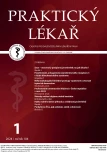Fezolinetant, the neurokinin 3 receptor antagonist in the treatment of vasomotor symptoms in perimenopause
Authors:
P. Křepelka
Authors‘ workplace:
Ředitel: doc. MUDr. Jaroslav Feyereisl, CSc.
; Ústav pro péči o matku a dítě, Praha
Published in:
Prakt. Lék. 2024; 104(1): 14-16
Category:
Of different specialties
Overview
Vasomotor symptoms in perimenopause (VMS) represent the most common health problem of menopausal women with a significant impact on their quality of life. The results of large clinical trials have led physicians and patients to question the safety of hormone therapy in perimenopause. Currently, there is evidence of high effectiveness and safety of hormone therapy in the treatment of vasomotor symptoms of menopausal syndrome, provided that contraindications to hormone therapy are respected and the risk-benefit ratio of treatment is individually assessed for each patient. Non-hormonal treatment modalities are available for women with contraindications to hormone therapy. A new perspective in the treatment of VMS is the neurokinin 3 receptor antagonist fezolinetant.
Keywords:
menopause – vasomotor symptoms – hormone therapy – hot flashes – perimenopause – neurokinin 3 receptor antagonists – fezolinetant
Sources
- The 2023 Nonhormone Therapy Position Statement of The North American Menopause Society Advisory Panel. The 2023 nonhormone therapy position statement of The North American Menopause Society. Menopause 2023; 30(6): 573–590.
- Neal-Perry G, Cano A, Lederman S, et al. 2023. Safety of fezolinetant for vasomotor symptoms associated with menopause: a randomized controlled trial. Obstet Gynecol. 2023; 141(4): 737–747.
- Crandall CJ, Manson JE, Hohensee C, et al. Association of genetic variation in the tachykinin receptor 3 locus with hot flashes and night sweats in the Women’s Health Initiative Study. Menopause 2017; 24(3): 252–261.
- Depypere H, Lademacher C, Siddiqui E, Fraser GL. Fezolinetant in the treatment of vasomotor symptoms associated with menopause. Expert Opin Investig Drugs. 2021; 30(7): 681–694.
- Freedman RR. Hot flashes: behavioral treatments, mechanisms, and relation to sleep. Am J Med. 2005; 118(Suppl 12B): 124–130.
- Gold EB, Colvin A, Avis N, et al. Longitudinal analysis of the association between vasomotor symptoms and race/ethnicity across the menopausal transition: study of women’s health across the nation. Am J Public Health 2006; 96(7): 1226–1235.
- Hansen PJ. Effects of heat stress on mammalian reproduction. Philos Trans R Soc Lond B Biol Sci. 2009; 364(1534): 3341–3350.
- Johnson KA, Martin N, Nappi RE, et al. Efficacy and safety of fezolinetant in moderate to severe vasomotor symptoms associated with menopause: a phase 3 RCT. J Clin Endocrinol Metab. 2023; 108(8): 1981–1997.
- Kenny GP, Sigal RJ, McGinn R. Body temperature regulation in diabetes. Temperature (Austin) 2016; 3(1): 119–145.
- Lederman S, Ottery FD, Cano A, et al. Fezolinetant for treatment of moderate-to-severe vasomotor symptoms associated with menopause (SKYLIGHT 1): a phase 3 randomised controlled study. Lancet 2023; 401(10382): 1091–1102.
- Nakamura K. Central circuitries for body temperature regulation and fever. Am J Physiol Regul Integr Comp Physiol. 2011; 301(5): R1207–1228.
- Purohit P, Sassarini J, Lumsden MA. Management of induced menopause in gynaecological cancers and their challenges. Curr Obstet Gynecol Rep. 2019; 8(3): 94–102.
- Rahman UA, Kashif TB, Usman M, et al. Efficacy and safety of fezolinetant, a neurokinin-3 antagonist, in treating vasomotor symptoms in postmenopausal women: a systematic review and meta-analysis. Medicine (Baltimore) 2023; 102(50): e36592.
- Rance NE, Dacks PA, Mittelman-Smith MA, et al. Modulation of body temperature and LH secretion by hypothalamic KNDy (kisspeptin, neurokinin B and dynorphin) neurons: a novel hypothesis on the mechanism of hot flushes. Front Neuroendocrinol. 2013; 34(3): 211–227.
- Randolph JF Jr, Sowers M, Bondarenko I, et al. The relationship of longitudinal change in reproductive hormones and vasomotor symptoms during the menopausal transition. J Clin Endocrinol Metab. 2005; 90(11): 6106–6112.
- Simon JA, Anderson RA, Ballantyne E, et al. Efficacy and safety of elinzanetant, a selective neurokinin-1,3 receptor antagonist for vasomotor symptoms: a dose-finding clinical trial (SWITCH-1). Menopause 2023; 30(3): 239–246.
- Skorupskaite K, George JT, Veldhuis JD, et al. Neurokinin 3 receptor antagonism reveals roles for neurokinin B in the regulation of gonadotropin secretion and hot flashes in postmenopausal women. Neuroendocrinology 2018; 106(2): 148–157.
- Woods NF, Mitchell ES. Symptoms during the perimenopause: prevalence, severity, trajectory, and significance in women’s lives. Am J Med. 2005; 118(Suppl 12B): 14–24.
- Wright KP Jr, Hull JT, Czeisler CA. Relationship between alertness, performance, and body temperature in humans. Am J Physiol Regul Integr Comp Physiol. 2002; 283(6): R1370–1377.
adresa pro korespondenci:
MUDr. Petr Křepelka, Ph.D.
Ústav pro péči o matku a dítě
Podolské nábřeží 157, 147 00 Praha 4 – Podolí
e-mail: petr.krepelka@upmd.eu
Labels
General practitioner for children and adolescents General practitioner for adultsArticle was published in
General Practitioner

2024 Issue 1
- Advances in the Treatment of Myasthenia Gravis on the Horizon
- Memantine in Dementia Therapy – Current Findings and Possible Future Applications
- Memantine Eases Daily Life for Patients and Caregivers
- Possibilities of Using Metamizole in the Treatment of Acute Primary Headaches
- Hope Awakens with Early Diagnosis of Parkinson's Disease Based on Skin Odor
-
All articles in this issue
- Snus – the new and former support agent: for how long?
- Fezolinetant, the neurokinin 3 receptor antagonist in the treatment of vasomotor symptoms in perimenopause
- Non-pharmacological treatment procedures used in patients suffering from dementia
- Occupational diseases reported in the Czech Republic in 2023
- Methods of measuring limb oedema volume: a literature review
- Risk of sudden cardiac attack and the number of push-ups managed
- Purkyne’s Review Živa – its Foundation, Fall and Renewal
- Eponyma v medicíně aneb po kom to slovo je
- General Practitioner
- Journal archive
- Current issue
- About the journal
Most read in this issue
- Fezolinetant, the neurokinin 3 receptor antagonist in the treatment of vasomotor symptoms in perimenopause
- Snus – the new and former support agent: for how long?
- Methods of measuring limb oedema volume: a literature review
- Risk of sudden cardiac attack and the number of push-ups managed
